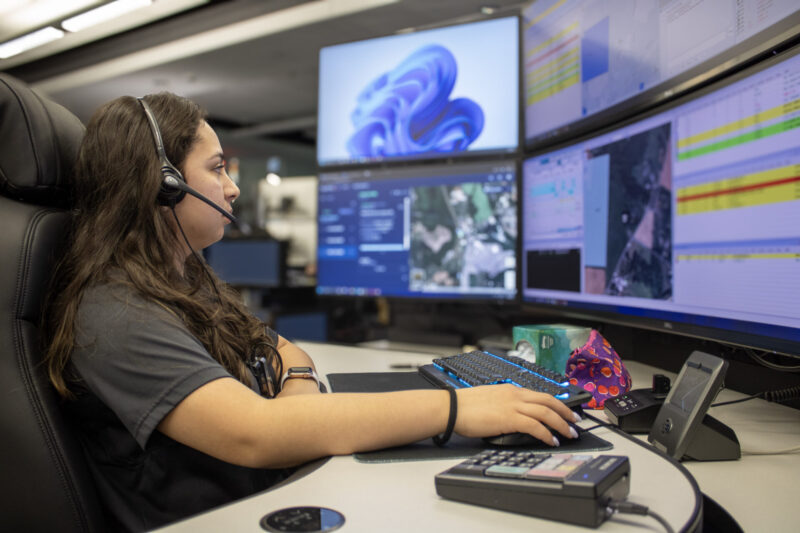
Special to IFN
In a dimly lit room lined with glowing monitors and a steady hum of radio chatter, the first line of defense for Iredell County springs into action — not with flashing lights or sirens, but with calm voices, quick thinking, and hearts that beat steadily through chaos. These are the voices behind the headset: the 911 telecommunicators.
When someone dials 911, it’s often the worst moment of their life. But on the other end of that call is someone trained, steady, and deeply committed to serving.
For Brittany Armstrong, being a telecommunicator is more than a job — it’s her calling.
“Every decision you make can literally be a decision of life and death,” she said. “We’re the first to hear everything. If they yell for help, we’re the first person to get there.”
Armstrong, like many of her colleagues, came to this role through both personal experience and passion. Her background in a public safety family helped pave the way, but she says it was the teamwork and purpose that made her stay.
“You cannot do this job by yourself,” she said. “When it hits the fan, we all come together.”
Brittany Durham, who joined the team after a nudge from a stranger in a hair salon, remembers the unity during the winter storm earlier this year when a firetruck overturned.
“Everyone was doing something,” she said. “When the smoke finally cleared, we all kind of sat there and looked at each other … It takes a lot of teamwork. That’s not something I’ve ever experienced in any other job I’ve had.”
The shared understanding among dispatchers is unlike anything else.
“We see each other more than our families,” Durham added. “We really do truly become like a family.”
And it’s not just about managing the chaos — it’s about transforming it.
Rachel Williams, who thrives in fast-paced, high-pressure environments, emphasized how the role reshaped her understanding of strength.
“This job pushes you to your limits,” she said. “You can handle more than you realize.”
Telecommunicators are often unseen and, until recently, under-recognized. But to those in the field, their impact is undeniable.
“Without us being here, responders wouldn’t be able to get help,” said Brittney App, a former EMT who transitioned to emergency communications after moving to the area. “We are the ones who make sure people are getting the help they need — even when they’re at their angriest.”
Deputy Director Nikki Carswell put it succinctly: “Being a telecommunicator is not just a job; it is a career. They are the first ones to help the caller on scene. They are the first to listen, to provide help. There is often a misconception that it is just people talking on the phone – but TCs are the first first-responders.”
Iredell County telecommunicators go through 12 weeks of intensive training followed by six months of probation, learning the nuances of fire, EMS, and law enforcement dispatch. The job requires precision, empathy, and resilience.
“You’ve got to be able to listen to multiple people talking in your ear at the same time,” App said. “I’ve always been the person that in chaos, I’m calmest.”
It’s a high-pressure career with high emotional costs. There are hard calls, including some that haunt even the most seasoned dispatchers. And while coping can be difficult, Iredell County provides support through peer groups and an on-staff clinician.
As Systems Administrator Scott Niblock noted, “You never know what kind of call you’re going to get … it’s often the worst day of that caller’s life, and you have to be a calm presence, a light in the dark.”
The gratitude may be quiet, but it matters.
“You don’t always get the thank yous,” said Williams. “But those are the ones that hold you over.”
During National Public Safety Telecommunicators Week, it’s fitting to take a moment and honor these unseen heroes. Because behind every flashing light and wailing siren, there’s a telecommunicator who made sure help was on the way.




There sure are a lot of Brittanys that work there lol. Seriously though, these men and women truly are unsung heroes. From taking that first call until the last unit clears, these headset heroes are making split second decisions that insure the safety of the callers, those they are calling about needing help, and the responders whom the dispatchers number one priority is to make sure they go home safely to their families after every call. They calm the frantic mother who just found her baby unresponsive and not breathing and provide life saving instructions to help until responders arrive. They mitigate the often times physical altercations between husband and wife until law enforcement arrives and take control. When you are at your worst, they are at their best! Thank you to the calm voices in the dark chaos! You are truly appreciated and highly unrecognized.